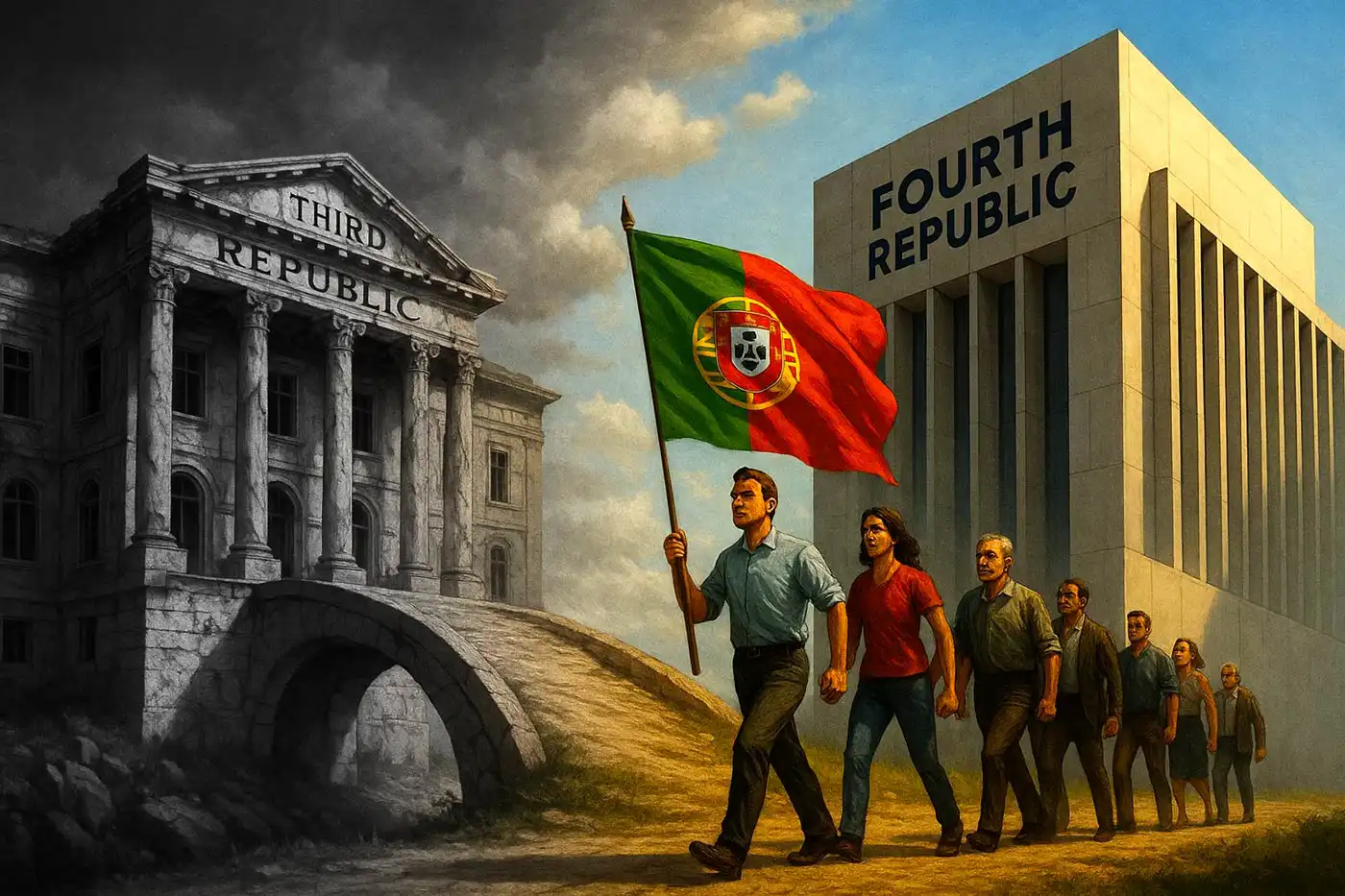Deputy Links “Uncontrolled Immigration” to Rising Crime on November 25, 2025
On a historic day for Portugal, Chega deputy Miguel Castro said that “uncontrolled immigration” is contributing to growing insecurity in Portugal. He blamed the country’s long left-leaning policies for weakening national values, reducing citizens’ rights, and creating conditions for more crime. Castro framed his remarks as a warning about what he sees as increasing social instability.
Uncontrolled immigration" was the central theme of Miguel Castro's speech, in which he criticized the country's left-wing trajectory which, he says, has led to the degradation of values, loss of rights and increased insecurity.
Calls for Constitutional Revision to Apply More Government Authority
Castro urged a revision of Portugal’s Constitution, claiming it still carries a “far-left mark” that limits the government’s authority. He argued that this constitutional change is necessary to give the country a clear direction and restore public confidence in state institutions. The deputy said such reforms would allow Portugal to return to what he described as its original values.
The CH MP considers a constitutional revision to be urgently needed, one that eliminates the "far-left" label that conditions the country.
Among other issues, he highlighted the lack of authority of the police, who are "attacked," leading to an increase in crime.
Miguel Castro has no doubt that a "Fourth Republic" is needed to defend Portugal's original values, with "freedom and democracy." For CH, however, what remains is still lacking: "fulfilling Portugal's purpose."
Freedom and democracy - alright yes, please - sounds good, right? But wait, didn’t his boss recently call for a return of António Salazar? Right, yes, that ruthless dictator that the Portuguese took 50 years to get rid of.
Something doesn’t quite add up. Could the deputy be sugarcoating things here a bit? So what are these values then? Let’s take a closer look at what values existed before the Third Republic.
Values Before the Third Republic
Before the Third Republic was established in 1974, Portugal was ruled by the Estado Novo (1933 - 1974), an authoritarian regime that emphasized nationalism, strong central authority, and conservative social policies.
For this regime, freedom wasn’t a thing.
Supporters of this period often point to stability, traditional family structures, and national pride as core values. Critics, however, highlight the lack of political freedom, censorship, repression of dissent and a police state as severe violations of basic rights.
One would think: rightly so.
Chega’s call to return to “original values” appears to reference this pre-1974 framework, as recently suggested by André Ventura when he repeatedly called for a Salazar style leadership to return to Portugal.
How Chega Acts
Although Chega presents its constitutional reform ideas in a calm and logical way, it is important to see them in the context of how the party works overall. Chega often uses strong, populist language. Its leaders make loud statements blaming the government, minorities, and political opponents for many problems. They often talk about bringing back “order” and changing the system completely.
This kind of language is very different from the more careful, everyday tone of their proposals. Chega wants people to see their reforms as sensible and fair. But critics say that the party’s real goal is not just to fix problems, but to change the political system in a way that gives them more power and less control from others. The party’s strong words help gain supporters by creating fear and anger, while the official proposals look moderate and reasonable.
Chega´s Double Approach
So, even if someone agrees with Chega’s ideas, it is important to know that the party uses this double approach:
strong, emotional, populistic messages to win support
official proposals that seem normal to gain credibility
This helps explain why CHEGA is a growing force in politics and why people should look carefully at what they say and do.
What Chega Wants
1. Reduce the number of Members of Parliament
Chega’s proposal: Cut the number of deputies in the Assembly of the Republic (for example, from the current 230 to a lower figure such as 150) in order to create a leaner, more efficient Parliament.
Implications / criticism: Fewer MPs can make decision‑making faster and cheaper, but may weaken representation for smaller regions and parties, reduce pluralism, and concentrate power, with potential effects on oversight and checks and balances.
2. Remove “ideological” language from the Constitution
Chega’s proposal: Delete what it describes as post‑revolutionary ideological language, particularly in the preamble and provisions seen as reflecting a left‑wing or revolutionary framing of the State.
Implications / criticism: Supporters frame this as neutralising the Constitution; critics argue it is itself an ideological move that could weaken historical context and the emphasis on social rights, shifting the text toward a more conservative reading.
3. Criminalise illicit or unjust enrichment
Chega’s proposal: Enshrine the crime of unjust enrichment in the Constitution to reinforce anti‑corruption tools, especially for holders of public office.
Implications / criticism: This is presented as strengthening integrity and public trust, but raises classic rule‑of‑law concerns: risk of reversal of the burden of proof, selective enforcement, and potential use as a political weapon if not very tightly defined and supervised.
4. Reshape appeals and create a constitutional protection appeal
Chega’s proposal: Streamline parts of the appeals system and introduce a constitutional protection appeal allowing direct recourse to the Constitutional Court in specific situations.
Implications / criticism: Proponents argue this can reduce delays and give citizens a clearer route to defend fundamental rights; critics fear restrictions on ordinary appeals and a greater centralisation of power in the Constitutional Court, which could, in practice, limit effective access to justice.
5. Tougher sentencing and penal policy
Chega’s proposal: Tighten penal policy and increase penalties for serious crimes, aiming at more effective and exemplary punishment, in some versions of the debate this includes discussion of life‑like sentences.
Implications / criticism: Supporters emphasise deterrence and public security; opponents warn about over‑penalisation, risks to proportionality, and disproportionate impact on more vulnerable or marginalised groups.
6. More transparency and a lighter state
Chega’s proposal: Strengthen transparency in public subsidies, benefits and state support, while reducing what it describes as the excessive weight of the State in the economy and society.
Implications / criticism: Transparency tends to attract broad support; controversy arises over what is reduced in practice. Depending on where cuts fall, critics fear erosion of social policies and public services, and a redistribution of costs and risks from the State to individuals and families.
7. Depoliticise key institutions
Chega’s proposal: Change appointment rules and internal arrangements in justice regulators, oversight bodies and other institutions to limit control by established parties and make them truly independent.
Implications / criticism: The goal of independence is widely shared in theory; sceptics point out that altering appointment mechanisms can simply replace one political influence with another and, without broad consensus, may deepen institutional polarisation rather than reduce it.
8. Electoral and institutional reforms
Chega’s proposal: Adjust electoral rules, including the possibility of a national compensation constituency, and clarify or recalibrate the powers of main state organs, in line with its broader discourse on institutional redesign.
Implications / criticism: A compensation circle can improve proportionality, but depending on its design it may favour certain parties; more generally, changes to competences can shift the balance between Parliament, Government and the President, altering how easily majorities can govern and how effectively they are controlled.
9. Strategic alignment with right‑of‑centre parties
Chega’s proposal: Promote a “platform of understanding” with PSD/CDS and Iniciativa Liberal to advance institutional reforms, while explicitly distancing itself from the Socialist Party (PS).
Implications / criticism: This reflects a deliberate right‑of‑centre bloc logic and increases the chances of passing some reforms, but also underlines that they are pursued without broad cross‑party constitutional consensus, which many constitutionalists view as important for stability and legitimacy.
10. Reform rather than open “regime change”
Chega’s proposal: The party insists it does not seek to overthrow the democratic regime but to reform institutions and make them more efficient, less captured and closer to citizens.
Implications / criticism: Even without formally changing the regime type, several proposals - particularly on the balance of powers, justice and rights - could amount to a significant reconfiguration of the current constitutional settlement. Critics therefore see a risk of incremental weakening of checks, guarantees and civil liberties, even if the formal labels remain the same.






Comments